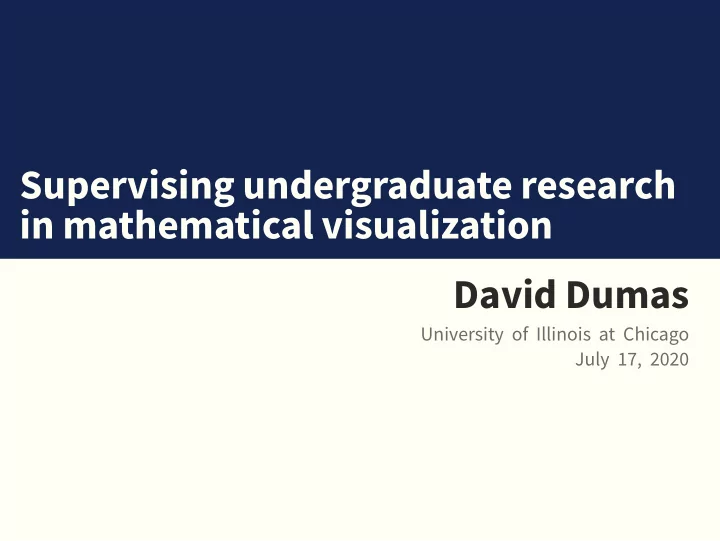

Supervising undergraduate research in mathematical visualization David Dumas University of Illinois at Chicago July 17, 2020
2015: Immersive visualization Idea: Interactive real-time view of data from the PML visualization project (w/F. Guéritaud) (These are point clouds in S n . Sometimes, n = 3.)
2015: Immersive visualization Structure: Supervision Separate projects Free choice of language, tools Lectures about PML
2015: Immersive visualization Result (George): WebGL PML dataset viewer Built with potree Javascript library
2015: Immersive visualization Result (Gilbert): First person PML dataset viewer Built with Unity (in C#)
Unity Popular 3D engine ofuen used for game dev (Pseudo-WYSIWYG 3D graphics app IDE) Proprietary / no-cost noncommercial licenses
2015: Immersive visualization Things I learned: A semester is very short Not knowing Javascript, WebGL, C#, or Unity led to me giving well-intentioned bad advice Trying to teach about PML was too amibitious
2016: Circle packing structures E. Dannenberg and I computed Idea: Build app to display circle packing CP 1 . . . . . .
2016: Circle packing Structure: Supervision Python Students collaborated on a single project Lectures about Möbius transformations and circle packings
2016: Circle packing Result: Bubble Wrap, a Python+Qt application
2016: Circle packing Things I learned: Version control (git): challenge, payofg Python GUI development headaches Helpful to have some code for students to look at
2016: Tangle toy moduli Idea: Visualize moduli space of the 8-arc tangle toy Following a 2015 preprint of K. Rafi and G. Zhang
2016: Tangle toy moduli Structure: Supervision Javascript + WebGL Lectures on linear algebra and 3D graphics One 90-minute meeting per week
2016: Tangle toy moduli Result: WebGL Tangle Toy Can rotate joints, but not constrained to be closed
2016: Tangle toy moduli Things I learned: The “just works everywhere” aspect of HTML+JS+WebGL is very powerful Can host live demo with GitHub pages Fewer, longer meetings work well
2017: Hyperbolic racquetball Idea: One-player VR racquetball in a hyp manifold + Screenshot of Curved Spaces by Jefg Weeks Photo by Donna Pool (CC BY-NC-ND) Use it to teach about hyperbolic geometry, multiply-connected spaces, etc.
2017: Hyperbolic racquetball Structure: Collaboration Unity + Oculus VR Template program (basic) Programming meetings (w/ TA) and project meetings (all)
2017: Hyperbolic racquetball Result: ManifoldBall VR racquetball in the 3-torus and other Euclidean orbifolds
2017: Hyperbolic racquetball Things I learned: Graphics programming (shaders, Unity internals) VR motion sickness Plans were wildly ambitious; fallback goal important
2017: 4D VR Result: 4DVR viewer for surfaces in R 4
2017: 4D VR Things I learned: Fast progress when no tutorial needed
2018: Slicing surfaces Idea: VR tool for simultaneous drawing/cutting on genus two surface and its universal cover Based on suggestion of M. Duchin
2018: Slicing surfaces Structure: Collaboration Extensive prep work: built non-VR MVP Required extensive programming background Long weekly meetings
2018: Slicing surfaces Result: GenusLab
2018: Slicing surfaces Things I learned: More 3D graphics (e.g. order independent transparency) VR controls are hard to get right Providing a large amount of starting code creates its own challenges
Some conclusions Right amount of structure can maximize student potential Avoid all-or-nothing goals Important to remember everyone has other activities
VR for undergrad projects Afuer several projects, I’m ambivalent. Novelty (+) Power (+) Complexity (-) Small audience (-) Alternative: WebGL first, then add WebVR/WebXR?
Unity for undergrad projects Afuer several projects, I’m ambivalent. Lowers barrier to entry (++) Vast feature set (+/-) C# (+/-) Takes some low-level control away (-) Moving target (-)
Unity for undergrad projects If the goal is to build a 3D graphics application in an undergraduate project, using a 3D engine deserves consideration. Perhaps Unreal Engine? (I haven’t tried it.) Increasingly, I see the size of the potential audience as an important consideration.
Future plans Definitely Web-target projects (HTML+JS+WebGL etc.) Projects that start with a MVP
Future plans Likely Supervision-only projects Summer or year-long projects Video/image projects
Future plans Probably not Projects with ambitious goals in both programming and learning research-level math Projects focused on building GUI sofuware
Observation I use skills learned while supervising these projects in my personal research.
Links Immersive visualization (2015) Project page [ http://mcl.math.uic.edu/fall-2015-projects/ ] Circle packing visualization (2016) Project page [ http://mcl.math.uic.edu/summer-2016-projects/ ] Source [ https://github.com/daviddumas/bubble-wrap/ ] Tangle toy moduli (2016) Project page [ http://mcl.math.uic.edu/fall-2016-projects/#TTM ] Virtual tangle toy [ https://uicmcl.github.io/ttm-mcl-fall2016/ ] Hyperbolic racquetball (2017) Project page [ http://mcl.math.uic.edu/spring-2017-projects/ ] (includes ManifoldBall download links) Source [ https://github.com/uicmcl/manifoldball/ ] Video [ https://www.youtube.com/watch?v=K6k6mYd5164 ]
Links Visualizing 4D with VR (2017) Project page [ http://mcl.math.uic.edu/fall-2017-projects/ ] (includes 4DVR download links) Source [ https://github.com/Brandon-Reichman/4DVR/ ] Slicing surfaces in VR (2018) Project page [ http://mcl.math.uic.edu/fall-2018-projects/#destop ] (includes GenusLab download links) Source [ http://github.com/uicmcl/genuslab-vr/ ]
Thank you. David Dumas david@dumas.io https://dumas.io
Recommend
More recommend